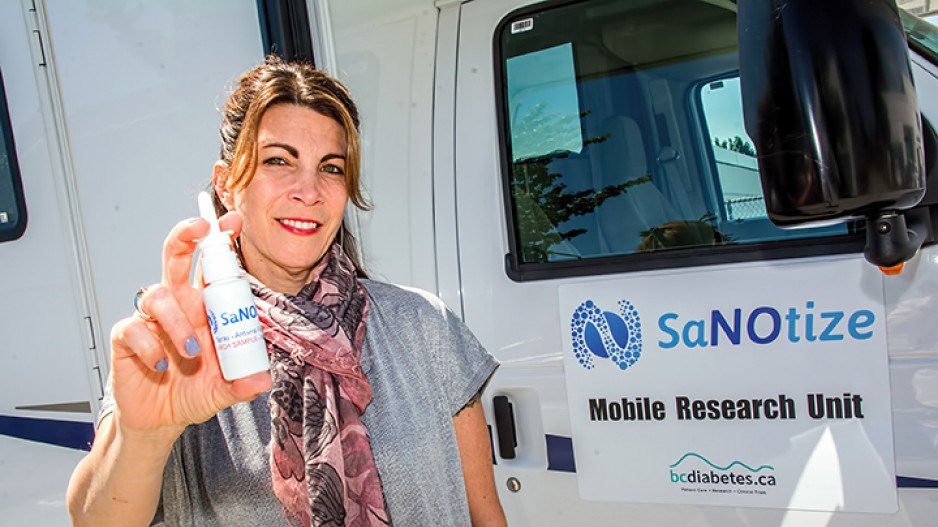If there has been a silver lining behind the otherwise menacing COVID-19 pandemic clouds for any sector of B.C.’s economy, it has been life sciences.
Vancouver biotech and medical device companies have recently received government funding, inked partnerships with big pharmaceutical companies and gained quick regulatory approvals to move their platforms and discoveries to the front of the clinical trial queue.
Digital health companies, meanwhile, have seen an uptick in demand for virtual doctor visits and other services.
ImmunoPrecise Antibodies (TSX-V:IPA), which specializes in custom antibody discovery and development, recently entered into a research collaboration agreement with the University of Victoria to develop a COVID-19 screening test. It raised $2.6 million in private placements in mid-May, and its stock has nearly tripled since the beginning of this year.
Vancouver’s SaNOtize Research and Development Corp. had already been in Phase 2 clinical trials for a spray that uses nitric oxide to treat chronic sinusitis and had an anti-viral formulation in the pipeline. So it was well positioned for a swift pivot to test the spray as a nasal sanitizer for preventing COVID-19 infections.
The National Research Council recently announced $400,000 in funding to help SaNOtize focus on COVID-19 applications, and Health Canada gave a quick approval for Phase 2 clinical trials in B.C. and Quebec.
“The moment COVID started, we immediately shifted, wrote an application for a full trial to Health Canada, got all the approval, and the hope is that we show efficacy results in this Phase 2 trial, then Health Canada will allow us to go directly into a Phase 4,” said Gilly Regev, SaNOtize’s CEO and co-founder.
In March, AbCellera, a private Vancouver biotech, announced a partnership with the American pharmaceutical company Eli Lilly and Co. (NYSE:LLY) to develop new drugs to prevent and treat COVID-19 virus infections.
In early May, the Canadian government announced $175.6 million in funding to AbCellera to help develop the antibody discovery platform and to build manufacturing infrastructure for antibody therapies for future viruses.
The urgency to develop vaccines and treatments for COVID-19 has also resulted in new partnership agreements.
Last week, Vancouver’s Precision NanoSystems Inc. announced that it is partnering with a Chinese company, CanSino Biologics Inc., to leverage Precision’s RNA to advance a potential vaccine candidate for human clinical trials.
Even biotechs that aren’t working on drugs or vaccines focused on COVID-19 may benefit from more attention from venture capitalists.
Fusion Genomics, which does DNA testing and genomic sequencing for pathogens, isn’t working on anything specific to COVID-19. But the company’s president and chief science officer, Mohammad Qadir, said the pandemic may sharpen venture capital’s focus on the biotech and diagnostics space in general.
“If you are in a diagnostic space, you are very far down the ladder, because diagnostic is not considered a very high activity area for venture capitalists to invest in. What we are hoping is that, post-COVID, that will change. If the world learns anything from this experience, it is that the time for genomic testing in infectious disease is now.”
Business has also picked up for digital and telehealth companies.
Telus Health confirms there was a 10-fold increase in the use of its virtual health care platform, Babylon, since March. A recent Frost and Sullivan market research study predicts that the pandemic will help cement the use of more telehealth use in North America.
Agartee Technology Inc. has seen a 400% increase in inquiries about its services, said the company’s CEO, Behzad Behroozan.
Agartee provides a remote vital signs monitoring service that uses sensors to automate the measurement of temperature, blood oxygen levels, sleep and physical activity.
The service is used mainly for seniors.
Agartee had already been working with the University of British Columbia’s Lung Centre and St. Paul’s Hospital on remote monitoring of respiratory disease symptoms. COVID-19 can cause severe respiratory infections.
“It was very natural for us to repurpose our respiratory symptom monitoring for symptom monitoring,” said Behroozan. “So we quickly started seeing a lot of interest from the government, from the clinics. So now I guess they’re getting, compared to before, about 400% more requests.”
Medimap is another digital health service company that has seen an increase in use during the pandemic lockdown. The company’s platform provides information on 1,200 walk-in clinics across Canada that people can access either online or through a smartphone app.
It not only identifies walk-in clinics that are open in their area, but also tells them what the expected wait times are. The company also launched a virtual consultation schedule in March that allows patients to speak to a doctor via video conference without having to go into a clinic.
“We can connect them with the next available doctor in their province who’s working out of a walk-in clinic in our network,” said Medimap CEO Blake Adam, who added that the average wait time is just nine minutes.
“Since introducing that, we’ve had, as you can imagine, a rapid uptake, given the times.”
Both doctors and patients in Canada have been slow to move to more online health care, but Adam thinks the pandemic may change that.
“Virtual care is fairly non-existent, at least in the Canadian landscape, in terms of regular practice,” Adam said. “I think now that we’ve kind of been forced to adopt it, on both the provider and patient side, a lot of people are seeing the benefits that it can provide.
“There’s an important part of care that needs to be delivered in person, of course, but I do imagine it’s going to stay a more mainstream part of the delivery.”




